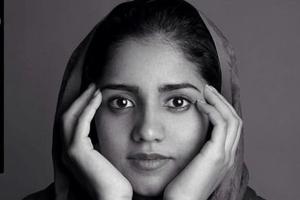Achievements
Generation Change: AU Student Uses Rap Music to Combat Old Customs

The MTV Europe Music Awards recently honored five people with a Generation Change Award, and a new American University student was among the young leaders recognized. Sonita Alizadeh traveled a remarkable path—literally and figuratively—to attend AU. She’s now taking classes in the English Language and Training Academy at AU’s School of Professional & Extended Studies. But it wasn’t so many years ago that she faced an uncertain future.
Alizadeh is a rapper and an activist against forced marriages. In many ways, her career is just beginning, but the MTV award made her appreciate some early accomplishments.
“I feel really happy because MTV valued the importance of my music. And I feel very proud because I was among so many other young, incredible activists who are using their own talent, in a unique way, to raise awareness about global problems,” says Alizadeh.
Beyond MTV, others have been inspired by Alizadeh. There’s even a 2015 documentary about her, appropriately titled Sonita.
The Power of Her Dreams
Alizadeh was born in Afghanistan during Taliban rule. Her family left the country to live in Iran, though they moved back and forth during Alizadeh’s formative years. When Alizadeh was 10 years old, she faced a potential forced child marriage, though at such a young age she barely understood the ramifications. At age 16, while her family again considered forcing her into marriage, she grew quite alarmed.
A forced marriage, essentially, is offering your daughter to marry a man in exchange for money. It’s a function of poverty and custom, and Alizadeh says her mother felt compelled to follow longstanding tradition. But Alizadeh soon sought help.
“I saw my dreams disappear for a moment when this was happening,” she says. “But the power of my dreams was stronger than my fears.”
Alizadeh discussed the issue with teachers, mentors, and her documentary filmmaker, Rokhsareh Ghaemmaghami. They talked with Alizadeh’s mother—then back in Afghanistan—and she gave her daughter time to finish schooling in Tehran. During this period, Alizadeh discovered rap and hip hop.
Listening to Eminem in Tehran
If you’ve ever seen the Eminem-starring film 8 Mile, you’ll remember a working-class kid using music to change his life. Tehran is nowhere near Detroit, but Alizadeh’s experiences aren’t altogether different. As a teenager, she was working her gymnasium-cleaning job when she heard an Eminem song. She doesn’t even remember which one, but she was hooked by the sonic, and sociopolitical, possibilities.
“I had heard rap before, but I never thought that I could use it. At that moment, I wanted to find a way to share my feelings through the music,” she says.
To express her emotions about forced marriages, she recorded “Brides for Sale.” Alizadeh had little familiarity with social media, so Ghaemmaghami helped her put it on YouTube. It’s safe to say, she never could have foreseen the video’s impact.
“I didn’t know it was going to be all over the world. After a few days, I realized that it was playing on TV in Afghanistan and my family saw it,” she recalls. “I was scared, because a woman singing in Afghanistan is considered a sin. But my mother was actually OK with it.”
Her video went viral, and a nonprofit called Strongheart was impressed. The group helped her secure a scholarship to attend high school in Utah. But while living in the US, the issue continued to gnaw at her.
“I had the best life. I was living my dream. Then I remembered my friends back in Iran who were still fighting to avoid child marriage,” she says.
Alizadeh became a global activist, performing everywhere from the United Nations to the Clinton Foundation. Alizadeh notes that the forced marriage problem extends far beyond Central Asia and the Middle East.
“I am hopeful. When I came to the US, the number of girls was like 15 million a year, but now it’s 12 million. I didn’t save a lot of lives. But I’m trying to bring a solution to this problem—to saves the lives of the next generation.”
The Beat Goes On
Alizadeh has only been at AU for four months, taking classes and sharpening her language skills. “I am very proud to be here, in the US, to continue my education,” she says.
In addition to her global outlook, Alizadeh is helping people close to her. She’s the first person in her family to graduate high school and attend college, and she’s encouraging her siblings to expand their horizons. Eventually, she’d like to study law, but she hasn’t decided in what capacity.
“I am pretty sure that I will continue my music. And I want to keep raising awareness about child marriage and other global problems like refugees and child labor,” she says. “I think I will be a lawyer who can rap.”
